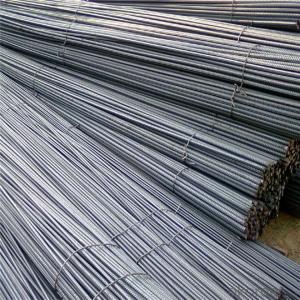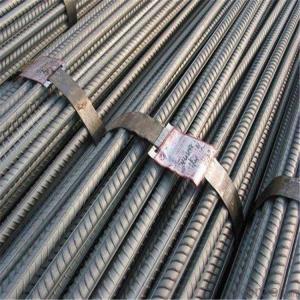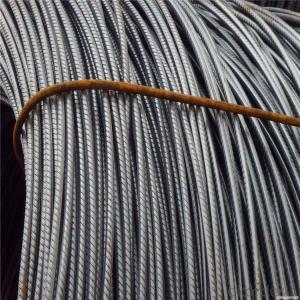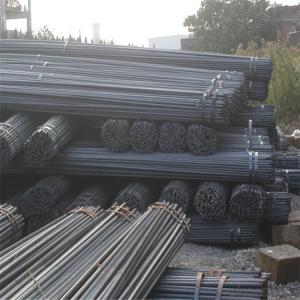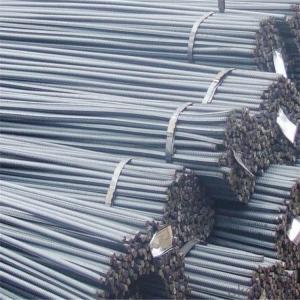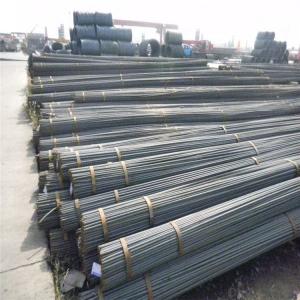Reinforcing Bars Hot Rolled Steel Bar
- Loading Port:
- Tianjin
- Payment Terms:
- TT OR LC
- Min Order Qty:
- 110 m.t.
- Supply Capability:
- 500000 m.t./month
OKorder Service Pledge
OKorder Financial Service
You Might Also Like
Item specifice
Reinforcing Bars Hot Rolled Steel Bar
Description of Reinforcing Bars Hot Rolled Steel Bar
1, Diameter: 5.5mm-10mm Reinforcing Bars Hot Rolled Steel Bar
10m- 40mm Reinforcing Bars Hot Rolled Steel Bar
2, Length: 6m, 9m, 12m or customized
3, Standard: GB, ASTM, AISI, SAE, DIN, JIS, EN
OEM technology - send detailed technical parameters for accurate quotation.
2, Produce Process: smelt iron - EAF smelt billet - ESR smelt billet -
hot rolled or forged to get the steel round bar and plate
3, Heat Treatment: annealing, normalizing, tempering, quenching
4, Surface Treatment: Black
5, Quality Assurance: We accept third party inspection for all orders.
You can ask testing organizations such as SGS, BV, etc. to test our products before shipping.
Chemical Composition of Reinforcing Bars Hot Rolled Steel Bar
Grade | Technical data of the original chemical composition(%) | |||||
Reinforcing steel bar HRB335 | C | Mn | Si | S | P | B |
≤0.25 | ≤1.60 | ≤0.80 | ≤0.045 | ≤0.045 | >0.0008 | |
Physics Capability | ||||||
Yield Strength(N/cm2) | Tensile Strength(N/cm2) | Elongation(%) | ||||
≥ 335 | ≥490 | ≥16 | ||||
Reinforcing steel bar HRB400 | C | Mn | Si | S | P | B |
≤0.25 | ≤0.16 | ≤0.80 | ≤0.045 | ≤0.045 | 0.04-0.12 | |
Physics Capability | ||||||
Yield Strength(N/cm2) | Tensile Strength(N/cm2) | Elongation(%) | ||||
≥ 400 | ≥ 570 | ≥ 14 | ||||
Products Show of Reinforcing Bars Hot Rolled Steel Bar
Company Information
CNBM International Corporation is the most important trading platform of CNBM group.
Whith its advantages, CNBM International are mainly concentrate on Cement, Glass, Iron and Steel, Ceramics industries and devotes herself for supplying high qulity series of refractories as well as technical consultancies and logistics solutions.


F A Q
1, Your advantages?
professional products inquiry, products knowledge train (for agents), smooth goods delivery, excellent customer solution proposale
2, Test & Certificate?
SGS test is available, customer inspection before shipping is welcome, third party inspection is no problem
3, Factory or Trading Company?
CNBM is a trading company but we have so many protocol factories and CNBM works as a trading department of these factories. Also CNBM is the holding company of many factories.
4, Payment Terms?
30% TT as deposit and 70% before delivery.
Irrevocable L/C at sight.
5, Trading Terms?
EXW, FOB, CIF, FFR, CNF
6, After-sale Service?
CNBM provides the services and support you need for every step of our cooperation. We're the business partner you can trust.
For any problem, please kindly contact us at any your convenient time.
We'll reply you in our first priority within 24 hours.
- Q:Can special steel be used in cryogenic applications?
- Indeed, cryogenic applications can utilize special steel. In particular, austenitic stainless steels like 304 or 316 are frequently employed in cryogenic settings because of their remarkable mechanical attributes and ability to withstand low temperatures. These steels maintain their strength, toughness, and ductility even in exceedingly cold environments, rendering them suitable for cryogenic use. Furthermore, special steels also exhibit commendable resistance to corrosion and thermal expansion, which are crucial considerations in cryogenic applications. In summary, special steel alloys possess a distinctive combination of properties that make them highly suitable for withstanding and functioning in extremely frigid conditions.
- Q:How does bearing steel contribute to the manufacturing of bearings?
- Bearing steel is a crucial material in the manufacturing of bearings as it provides the necessary strength, durability, and wear resistance required for the efficient operation of bearings. The high carbon content in bearing steel enhances its hardness and strength, ensuring that the bearings can withstand heavy loads, high speeds, and extreme operating conditions. Additionally, the unique composition and heat treatment of bearing steel enable it to maintain dimensional stability and minimize friction, leading to improved performance and longer life of the bearings.
- Q:How does special steel contribute to the formability of products?
- Special steel, which is also known as alloy steel, plays a vital role in enhancing the formability of products. Various industries, including automotive, aerospace, and construction, find special steel to be an ideal choice due to its unique properties and composition. One way in which special steel contributes to product formability is through its exceptional strength and durability. Engineered to have a higher tensile strength compared to regular steel, special steel can undergo significant deformation without breaking or cracking. This characteristic allows manufacturers to shape and mold the steel into intricate and complex designs, resulting in products with improved formability. Moreover, special steel offers excellent resistance to deformation, specifically elastic deformation. This means that even after enduring significant stress or strain, the steel can return to its original shape, minimizing the risk of permanent deformation. Such a feature proves advantageous in applications where products need to withstand repeated bending or shaping without compromising their structural integrity. Additionally, special steel often contains specific alloying elements like chromium, nickel, or molybdenum, which further enhance its formability. These alloying elements improve the steel's ability to be easily formed and manipulated, making it more ductile and minimizing the chances of cracking during the forming process. Furthermore, special steel can undergo heat treatment to modify its mechanical properties and enhance its formability. Annealing or quenching are some of the heat treatment processes that can make the steel more malleable, allowing for easy shaping and forming into desired products. In conclusion, special steel plays a critical role in enhancing product formability due to its exceptional strength, resistance to deformation, inclusion of alloying elements, and heat-treatability. These properties enable manufacturers to create products with intricate designs and complex shapes, fulfilling the diverse needs of various industries while ensuring durability and structural integrity.
- Q:How is mold steel used in the production of plastic injection molds?
- Mold steel is used in the production of plastic injection molds due to its high strength, wear resistance, and ability to withstand high temperatures. It is used to create the core and cavity of the mold, which are crucial components that shape the plastic parts. Mold steel ensures precise and accurate molding, prolongs the mold's lifespan, and enables the production of high-quality plastic products in a cost-effective manner.
- Q:What are the different methods of preventing intergranular corrosion in special steel?
- There are several methods available to prevent intergranular corrosion in special steel. 1. Heat Treatment: One effective method is to subject the steel to a heat treatment process called solution annealing. This involves heating the steel to a high temperature and then rapidly cooling it. This process helps to dissolve any precipitates or carbides that may have formed along the grain boundaries, thus reducing the risk of intergranular corrosion. 2. Alloying: Another approach is to add specific alloying elements to the steel composition. For example, the addition of elements like chromium and molybdenum can enhance the steel's resistance to intergranular corrosion. These alloying elements form a protective oxide layer on the surface, preventing corrosion from occurring along the grain boundaries. 3. Passivation: Passivation involves treating the steel surface with chemicals that create a protective layer. This layer acts as a barrier, preventing the corrosive environment from reaching the grain boundaries. Commonly used passivation techniques include acid pickling and electrochemical methods. 4. Sensitization Control: Special attention must be given to the sensitization process, which occurs when the steel is exposed to high temperatures for a prolonged period. This can lead to the precipitation of chromium carbides along the grain boundaries, making the steel susceptible to intergranular corrosion. By carefully controlling the heating and cooling rates during processing, sensitization can be minimized or prevented. 5. Corrosion Inhibitors: Another option is to use corrosion inhibitors, which are chemicals that can be applied to the steel surface to protect it from corrosion. These inhibitors form a protective film on the surface, preventing the corrosive agents from attacking the grain boundaries. It is important to note that the specific method used will depend on the type of special steel and the intended application. The selection of the most appropriate method should be based on a thorough understanding of the steel's composition, processing conditions, and the anticipated corrosive environment.
- Q:What are the different methods of surface lapping for special steel?
- There are several different methods of surface lapping for special steel. These methods are used to achieve a high level of flatness and smoothness on the surface of the steel. One common method is called free abrasive lapping. In this method, a slurry containing abrasive particles is used to polish the surface of the steel. The slurry is typically applied to a rotating lap plate, which is then pressed against the steel surface. The abrasive particles remove material from the surface, resulting in a smoother and flatter surface. Another method is called fixed abrasive lapping. In this method, a rigid lap plate with abrasive particles embedded in it is used to polish the steel surface. The lap plate is typically made of a harder material than the steel being lapped. As the lap plate rotates and is pressed against the steel surface, the embedded abrasive particles remove material, resulting in a smoother surface. Chemical lapping is another method that can be used for special steel. In this method, a chemical solution is applied to the steel surface. The chemical solution reacts with the surface of the steel, dissolving and removing a thin layer of material. This method is often used when a high level of flatness is required. Ultrasonic lapping is a method that uses ultrasonic vibrations to enhance the lapping process. In this method, the steel surface is placed in contact with a bath of abrasive particles and a liquid medium. Ultrasonic vibrations are then applied to the liquid medium, causing the abrasive particles to vibrate and remove material from the surface of the steel. This method can be particularly effective for lapping hard and brittle materials. Overall, the different methods of surface lapping for special steel offer various approaches to achieve the desired level of flatness and smoothness. The selection of the method depends on factors such as the type of steel, the desired surface finish, and the specific requirements of the application.
- Q:What are the requirements for special steel used in robotic applications?
- Special steel used in robotic applications must possess certain key requirements to ensure optimal performance and reliability. These requirements include: 1. High strength: Special steel for robotic applications needs to have excellent strength properties to withstand the stresses and loads encountered during robotic operations. It should offer superior tensile and yield strength to ensure structural integrity and prevent failure under heavy loads. 2. Wear resistance: The steel used in robotic applications should exhibit high wear resistance to withstand repetitive motions, sliding, and abrasive contact with different surfaces. This helps to minimize wear and tear, extending the lifespan of the robotic components. 3. Corrosion resistance: Robotic applications can often involve exposure to various environments, including moisture, chemicals, and other corrosive agents. Therefore, the special steel utilized should possess excellent corrosion resistance to prevent degradation and maintain performance over time. 4. Toughness: Special steel should have good toughness, enabling it to absorb energy and resist fracture or cracking. This is crucial to ensure that the steel can withstand sudden shocks or impacts without catastrophic failure, enhancing the safety and reliability of the robotic system. 5. Machinability: Robotic components often require complex shapes and precise dimensions. Therefore, the special steel used should have good machinability, allowing for easy cutting, shaping, and forming without excessive tool wear or difficulties in manufacturing. 6. Heat resistance: Robotic applications sometimes involve exposure to high temperatures, such as in welding or metalworking processes. It is important for the special steel to have good heat resistance to maintain its mechanical properties and structural integrity under elevated temperatures. 7. Magnetic properties: Certain robotic applications may require non-magnetic steel to prevent interference with electromagnetic sensors or systems. Therefore, special steel with low magnetic permeability is often preferred for such applications. By meeting these requirements, special steel used in robotic applications can provide the necessary strength, durability, and performance needed to facilitate efficient and reliable robotic operations in various industries, such as manufacturing, healthcare, and exploration.
- Q:What are the different pharmaceutical grades of special steel?
- There are various pharmaceutical grades of special steel that are specifically designed and produced to meet the stringent requirements of the pharmaceutical industry. These grades are used in the manufacturing of equipment, instruments, and components that come into direct contact with pharmaceutical products. The different pharmaceutical grades of special steel include: 1. 316L Stainless Steel: This grade is widely used in pharmaceutical applications due to its excellent corrosion resistance and high purity. It is often referred to as surgical stainless steel and is suitable for parts that require frequent cleaning and sterilization. 2. 304 Stainless Steel: This grade is also commonly used in the pharmaceutical industry for its corrosion resistance and ease of fabrication. It is suitable for equipment and components that do not require as frequent cleaning or sterilization. 3. Duplex Stainless Steel: This grade offers a combination of high strength and corrosion resistance, making it suitable for applications where durability and reliability are key. It is often used in pharmaceutical processing equipment that handles aggressive chemicals or high-pressure environments. 4. Hastelloy: This is a nickel-based alloy that exhibits superior resistance to corrosion, heat, and chemicals. It is commonly used in pharmaceutical applications where extreme conditions are present, such as in reactors or vessels that handle highly corrosive substances. 5. Titanium: Although not technically steel, titanium is often considered a pharmaceutical-grade material due to its excellent biocompatibility and corrosion resistance. It is used in medical implants and devices, as well as in pharmaceutical equipment that comes into contact with sensitive drugs. These pharmaceutical grades of special steel are carefully selected based on their specific properties and suitability for pharmaceutical applications. They are manufactured and tested to ensure compliance with industry standards and regulations, such as Good Manufacturing Practices (GMP) and the United States Pharmacopeia (USP). Using the appropriate grade of steel in pharmaceutical manufacturing helps to ensure product safety, quality, and integrity.
- Q:What are the properties of tungsten alloys?
- Tungsten alloys possess high density, exceptional strength, and excellent heat resistance. They exhibit excellent corrosion resistance, good electrical conductivity, and are highly resistant to wear and deformation. Additionally, tungsten alloys have a high melting point, making them suitable for applications in extreme environments such as aerospace, defense, and medical industries.
- Q:How does special steel perform in magnetic fields?
- Special steel typically has low magnetic permeability, which means it is not strongly affected by magnetic fields. This property makes it useful in applications where magnetic interference needs to be minimized, such as in electrical transformers or magnetic resonance imaging (MRI) machines.
1. Manufacturer Overview |
|
|---|---|
| Location | |
| Year Established | |
| Annual Output Value | |
| Main Markets | |
| Company Certifications | |
2. Manufacturer Certificates |
|
|---|---|
| a) Certification Name | |
| Range | |
| Reference | |
| Validity Period | |
3. Manufacturer Capability |
|
|---|---|
| a)Trade Capacity | |
| Nearest Port | |
| Export Percentage | |
| No.of Employees in Trade Department | |
| Language Spoken: | |
| b)Factory Information | |
| Factory Size: | |
| No. of Production Lines | |
| Contract Manufacturing | |
| Product Price Range | |
Send your message to us
Reinforcing Bars Hot Rolled Steel Bar
- Loading Port:
- Tianjin
- Payment Terms:
- TT OR LC
- Min Order Qty:
- 110 m.t.
- Supply Capability:
- 500000 m.t./month
OKorder Service Pledge
OKorder Financial Service
Similar products
New products
Hot products
Related keywords
